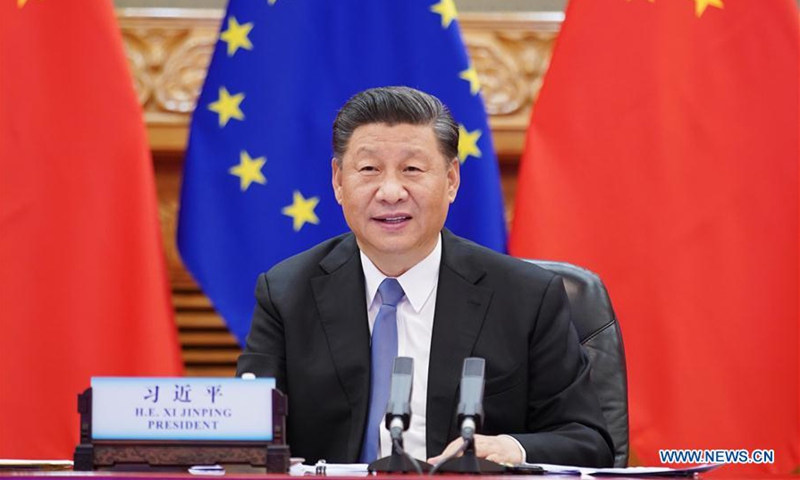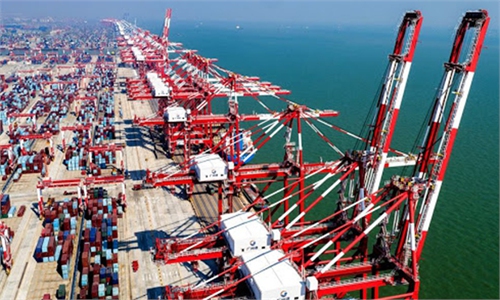Xi urges sound ties with Europe
Virtual summit shows China, EU to focus on cooperation over differences

Chinese President Xi Jinping meets with President of the European Council Charles Michel and President of the European Commission Ursula von der Leyen via video link in Beijing, capital of China, June 22, 2020. (Xinhua/Wang Ye)
Chinese, German and EU leaders reaffirmed that they will further strengthen cooperation from trade to epidemic control during a virtual summit on Monday, sending what experts call a resounding signal that the parties remain committed to pursuing pragmatic engagement rather than differences, as some ill-advised officials and pundits in the US are actively pushing for.
During the meeting with German and EU leaders, Chinese President Xi Jinping stressed that China and the EU must adhere to four commitments, namely peaceful coexistence, open cooperation, multilateralism, as well as dialogue and consultation, in order to push for the sound development of bilateral ties.
The Chinese and EU leaders stated their commitment to speed up the negotiations of the China-EU Bilateral Investment Treaty to achieve the goal of concluding the negotiations within this year.
The leaders announced the official signing of the China-EU agreement on geographical indications. They also decided to establish a China-EU High Level Environment and Climate Dialogue and a China-EU High Level Digital Cooperation Dialogue, and to forge China-EU green and digital partnerships.
The virtual meeting is set to inject impetus to China-Europe cooperation, particularly in economic and trade, and provide desperately needed confidence into a global economy battered by not only a global pandemic but also geopolitical and trade tensions created by an increasingly destructive US government, Chinese experts said.
Cooperation over differences
Xi met with German Chancellor Angela Merkel, President of the European Council Charles Michel and President of the European Commission Ursula von der Leyen via video link. The meeting was the second such high-level meeting between China and Europe in three months, and also followed a series of diplomatic engagements between the two sides since the outbreak of the COVID-19. Xi met Michel and von der Leyen on June 22 via video link.
Among the significant outcomes of the summit was a reaffirmation from the leaders that they will complete negotiations for a bilateral investment treaty (BIT) by the end of the year. The deal, once signed, is expected to greatly expand each other's market and provide greater protection.
They also agreed to set up high-level dialogues for environment and climate as well as the digital field, signaling that the two sides are further expanding their areas of cooperation, as the US withdrew from the Paris Agreement on climate change and is constantly pushing for clashes in the digital field with crackdowns on Chinese tech firms.
During the meeting, Xi noted that the COVID-19 pandemic has accelerated the once-in-a-century transformations unfolding in the world and placed humanity at a new crossroads. It is important that China and the EU remain steadfast in pursuit of sound and steady growth of their comprehensive strategic partnership.
While China and the EU have been maintaining close diplomatic interactions during the raging pandemic, they also have had differences on several fronts, including Hong Kong, Xinjiang and 5G.
During the virtual summit, Xi clarified China's stance on Hong Kong and Xinjiang affairs, saying that such affairs are China's right to defend its sovereignty, security and unity, and that China firmly opposes anyone and any force that sows instability, secession and unrest in China, and interferes in China's internal affairs.
Regarding human rights, Xi stressed that there was no unified path of development and there is no best protection of human rights but only better protection, and that all countries should take care of their own matters first. China does not accept a "preacher of human rights" and opposes double standards.
On the economic front, Xi said that China closely monitors recent trends in the EU regarding 5G, foreign investment reviews, government procurement and other areas, and hopes that the EU maintains an open investment and trade market.
Wang Yiwei, director of the Center for European Studies at Renmin University of China in Beijing, told the Global Times on Monday that many of China's investments and increasing economic influence in Europe made some conservative forces in the EU say that China and the EU will have conflict, so China has to stress the sincerity and importance of "peaceful coexistence."
"Rising protectionism and unilateralism, especially in the US, are threatening the stability of the international situation and world economic recovery. China and the EU, as the major powers to stabilize the international situation, share common interests to uphold opening-up and cooperation, as well as multilateralism," Wang said.
The EU and China also have differences over some sensitive topics, like Xinjiang and Hong Kong affairs. So, both sides should insist on dialogue and consultations, rather than confrontation which would amplify these differences and disrupt cooperation, Wang noted.
During the virtual summit on Monday, China and the EU also moved into a landmark agreement on protecting the Geographical Indications of 100 of each other's products, the first major agreement between the two sides. Set to take effect at the beginning of 2012, the agreement will be expanded to cover 175 additional GI names from both sides within four years.
"The signing of the agreement is of great significance and marks strides made in China-EU trade cooperation, as such an agreement shows an enhanced awareness of intellectual property protection and mutual acknowledgement of cultural and historical values behind the GIs," Cui Hongjian, director of EU Studies at the China Institute of International Studies, told the Global Times on Monday.
Rejection of US meddling
The timing of this China-EU summit - only weeks ahead of the US election - shows that policymakers from both Beijing and Brussels are determined to strike deals independently, and the specific persistent problems during the negotiations only proves the genuine sincerity from the two, Cui noted.
It is yet to rule out the possibility that some US-endearing politicians in the EU are waiting on Joe Biden winning the election, and preparing to align with the new Biden administration on handling China, and they tend to float unreasonable requests and deliberately delay negotiations, Cui warned.
Even as it picks up fights with Europe on multiple fronts, from trade to the military, and its president repeatedly scolds Europe in a wide range of areas, from immigration to energy supply, the US is also seeking to meddle in China-Europe relations. Last month, US Secretary of State Mike Pompeo traveled to Europe on what some Chinese experts called a trip of lies and fear-mongering over China.
Chinese experts said China and the EU are the victims of US unilateralism, and this is why the leaders of both sides agreed to jointly build the partnership on the issues of environmental protection and climate change, as well as digital cooperation.
While the US is mired in a series of crises from the worst outbreak of the COVID-19, to constant social unrest, to a teetering economy, China and the EU are keen to accelerate the recovery process from the pandemic and jump-start their own economies - another common interest that experts say could bring the two sides to cooperate.
In the first eight months of the year, China's trade with the EU grew by 1.4 percent year-on-year to 2.81 trillion yuan ($411.95 billion), according to official Chinese data. Though that is lower than trade between China and ASEAN, which grew 7 percent to 2.93 trillion, it still is higher than trade between China and the US, which fell 0.4 percent to 2.42 trillion yuan.
Also, in the second quarter of the year, China overtook the US as Germany's largest export market, with German exports to China reaching 23 billion euros ($27.25 billion).
Chinese analysts said that the interdependency and complementarity of China-EU trade ties would be significant for both sides to realize economic recovery in the post-pandemic era.
But the differences between the two sides could also impact the cooperation, and the EU continues to monitor China's development, so China also needs to be prepared for changes in China-EU relations, said analysts.





